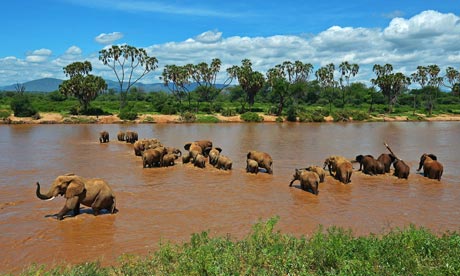Through partnerships” development professionals can help improve land governance and ensure more enforceable land rights
By Karol Boudreaux

Land rights often become the elephant in the room in African agriculture discussions. Photograph: Carl De Souza/AFP/Getty Images
What elephant lives in your development space? Last week in Cape Town at Grow Africa's Investment Forum” Rwanda's minister of agriculture and animal resources” Agnes Kalibata” called out the elephant she sees in discussions of African agriculture: land rights.
If you work on food security” climate change” women's empowerment” conflict or economic growth” chances are that you've also encountered the land elephant – the big” complex” disruptive element that frustrates so many development efforts.
Precisely because land is a complex and controversial issue – one that can be expensive to address in addition to being politically and culturally charged – many development professionals have shied away from it. But this is changing.
Greater willingness on the part of governments” donors” civil society” and the private sector to work together and invest to improve land governance means that people around the world have real hope of stronger” clearer” and enforceable rights to land and other resources.
One of the most encouraging developments has been the unanimous adoption by 96 countries of the voluntary guidelines on the responsible governance of tenure of land” fisheries and forests in the national context of food security last year. The VGs are a critical achievement: they underscore the importance of formalising customary tenure rights by strengthening women's land and resource rights and the tenure rights of indigenous people. The VGs enshrine principles of transparency and accountability in land governance and provide guidance on issues as diverse as market-based investments” taxation and valuation” and post-conflict land concerns.
This year” under the leadership of the UK” the G8 is likely to continue the push for improved transparency in the land sector. This is good news for the 70% of the world's people who live without formal” documented rights to land. But of course” there is much more to be done.
The challenge is to expand people's opportunity to improve their lives by securing their property rights.
These foundational issues are being tackled by a growing number of organisations” many of which are supported by the Omidyar Network. In partnership with governments and donors” development groups are using innovative and scalable approaches to secure women's rights to land” to formalise and register land rights” and to protect and transform critical ecosystems.
In Kenya” the rural development institute Landesa has worked with USAid and the Kenyan government to educate elders and community members on new constitutional provisions that give women equal rights to land. Elders took part in interactive sessions that explored the many ways women contribute to families and the broader community and how the entire community would benefit from securing their right to land.
School curriculums were reframed to address the new rights women have” and women themselves were educated about their rights. Elders responded by creating a new katiba (constitution) that holds them accountable for enforcing the rights of their wives and daughters to land. They went so far as to elect women as elders to sit alongside them and make decisions about how to allocate the community's valuable resource: its land. This hands-on” participatory model is scalable across Kenya.
In Bolivia” a Mercy Corps project called Red Tierras uses low-cost property registration software and SMS messaging to reduce the expense and dramatically speed up the process of formally registering rights to rural land. The project has helped thousands of local people cut years off the wait time for obtaining formal documentation to their lands. Now more Bolivians have a parcel they can confidently call their own. This project also has the potential to move into other countries and help thousands more people.
In India” many commons have been degraded as a result of the insecure rights local people have over these resources. Forests have been cut” watersheds harmed and” as a result” communities struggle to grow the food they need. The Foundation for Ecological Security is working with nearly 4″200 villages and eight state governments in India to secure community rights to over half a million acres of these valuable resources. FES helps communities as they develop holistic land use plans designed to revitalise watersheds and” in turn” improve livelihoods and food security.
The successes of the organisations mentioned mean that their work can be replicated and scaled up to expand opportunity for millions of people by advocating for and enabling more secure rights to land and other resources.
While the land elephant may be a difficult and frustrating beast to work with” through creative” sustained engagement with communities and governments” positive social change is possible and” importantly” scalable.
Karol Boudreaux is director of investments at the Omidyar Network
See original article at The Guardian
